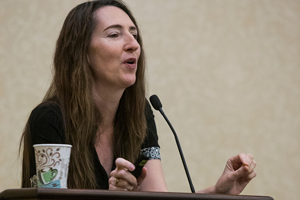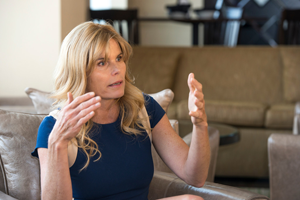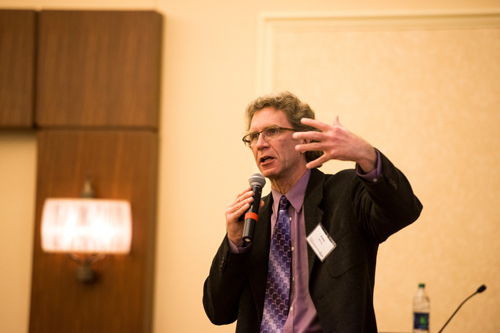It was the fifth time that George Mason University hosted the conference on “Leading to Well-Being” but my first visit, and I’m so glad I attended! The goal of the conference is to explore “the innovative intersections of leadership and well-being” and it far surpassed my expectations. This year’s theme was Thriving Together “to inspire human flourishing throughout the world in small and large ways” and Nance Lucas, executive director of the university’s Center for the Advancement of Well-Being sees that more as a goal than an outcome. The event was flawlessly organized and all of the speakers had something important and interesting to contribute. My only criticism was that the conference wasn’t longer so that there were more opportunities to hear all the breakout talks and speakers, but what I heard I loved!
Sonja Lyubomirsky, Ph.D., is a research scientist and author of Myths of Happiness: What Should Make You Happy, but Doesn’t, What Shouldn’t Make You Happy, but Does (Penguin). She defined “happiness” as frequent positive emotions and a sense that we’re proceeding toward our life goals, something that brings more life satisfaction than focusing on material achievements. And she had the research to back it up! She’s done more than 225 cross-cultural studies on the benefits of happiness.

Some of Dr. Lyubomirsky’s studies revealed that it’s our misconceptions of what happiness is, based on our life experiences, that drive us in search of it. She surveyed thousands of people and asked three basic questions:
- What makes people happy?
- How important is happiness to you?
- How can people learn to lead happier lives?
Among her results were several reasons why science proves we should increase the happiness quotient in our lives. Happy people:
- have lower incidence of stroke and are less likely to die early of all causes
- are less likely to catch colds—their immune systems are stronger
- are better creative problem solvers
But it wasn’t all unicorns and moonbeams. Dr. Lyubomirsky also gave us some reasons to be pessimistic about happiness:
- There’s a genetic component and we all have a hardwired set point.
- Happiness is a personality trait.
- We adapt to the positive (“hedonic adaptation”) so that things that once made us happy may not always make us happy.
Despite this, a large portion—about 40%—of our happiness is within our power to change.
She also shared her myths of happiness:
- I’ll be happy when…I’m married to the right person.
- I’ll be happy when…I have kids.
- I’ll be happy when…I have the right job.
- I’ll be happy when…I’m rich.
- I can’t be happy when…the test results were positive.
- I can’t be happy when…the best years of my life are over.
Seeing the myths presented in this way made me realize that we put so much energy into the “when I…” what a waste of life!
There were a lot of great takeaways from this talk and the breakout group I attended afterward. I think my favorite was:
“Almost nothing is as misery-inducing as we think it is.”
I’m so glad I heard Dr. Lyubomirsky speak because she reinforced what I’ve believed for a long time: We need to unlearn our misconceptions of what happiness is and what our ideal life is supposed to be. And of course I downloaded her Live Happy app!

I’d first met the second keynote speaker earlier this year at a retreat lead by Dr. Joe Dispenza. Dr. Rollin McCraty is the Director of Research at the Institute of HeartMath, an organization dedicated to helping people reduce stress, self-regulate emotions, and build resilience. Dr. McCraty focused on our capacity for psychological resilience, which he defines as “the capacity to prepare for, recover from, and adapt in the face of stress, change, and adversity,” by showing how heart and brain interactions influence human health, behavior, and well-being.
Dr. McCraty explored lots of remarkable science about our hearts. Did you know:
- The heart sends more information to the brain than the brain sends to the heart?
- Heart signals especially affect the brain centers involved in strategic thinking, reaction times, and self-regulation?
- The heart generates oxytocin, the love hormone?
- The heart is the organ with the largest magnetic field in the human body? About 60 times greater than the brain’s.
- The heart has its own complex nervous system, the “heart brain” neuro-system?
- Emotions are reflected in the patterns of our hearts’ rhythms? This is called Heart Rate Variability, or HRV, and it can be correlated to personality types.
HRV can be coherent or incoherent. A coherent state requires feeling and emotion; you can’t just think your way into it. Incoherent heart rhythms inhibit brain function, while coherent heart rhythms facilitate brain function. Any change in emotion has an effect on the nervous system, which then has an effect on the heart. In other words, a coherent heart builds resilience. It has the capacity to prepare us for recovery from, and help us adapt to, stress, challenges, or adversity. Resilience is the key to self-regulation.
All the big neuroscientists seem to have an app, and Dr. McCraty is no exception. Check out Inner Balance.
I am cooking up more ways to get Dr. McCraty involved with Rewire Me. Stay tuned…

Actress Mariel Hemingway closed the day with her candid and touching insights about balanced living and mental heath awareness. She showed a clip from her recently released film Running from Crazy (produced by Oprah Winfrey and directed by Barbara Koppel). The commentary examines Mariel’s quest to understand her famous family’s complex psychological history. Seven members of her family (including her grandfather, Ernest Hemingway, and her older sister, Margaux) have committed suicide, and addictive behavior was the norm when she was growing up. Through commitment to physical, psychological, and spiritual wellness, Mariel changed the script, broke the “family curse,” and has learned to thrive. Like all the speakers, Mariel was hugely inspiring.
I’m already looking forward to attending Leading to Well-Being next year!

Rose Caiola
Inspired. Rewired.


